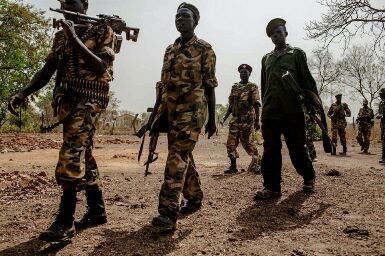Defecting generals from W. Bahr el Ghazal’s Wau town speak out
April 27, 2014 (ADDIS ABABA) – Senior army officers who mutinied on Saturday in Western Bahr el Ghazal state capital Wau said their defection to opposition forces led by former vice-president, Riek Machar came after they were targeted based on their ethnicity in the aftermath of an alleged massacre in which 192 unarmed Nuer trainee soldiers were killed in Mapel, east of Wau town.

“We thought we were part of the army and the system fighting against the rebels. Some of the Nuer senior officers taken from Wau recently came back wounded as they fought for the government in Unity state, Upper Nile and Jonglei states. Yet our colleagues from the Dinka tribe wanted to kill us too,” Makuach told Sudan Tribune by phone from near Wau town.
“We didn’t want to cause harm to the civil population or destruction to their properties, so we had to march out,” he added.
He also condemned what he said was the massacre of unarmed Nuer soldiers at a Mapel training camp, describing the incident as premeditated mass murder based on ethnicity.
“The government lied that it was an internal mutiny within the army in Mapel. This is not true,” said the senior officer.
“Brig General Baak (a Dinka) separated the Dinka trainees and took them away from the training centre, and the next day hundreds of armed Dinka came back and attacked the training centre, shooting at everybody, including women and children who were families of the trainees,” he further explained.
According to Makuach, the incident occurred as the attackers beat to death an unarmed Nuer soldier found in the market near the training centre after which the “assailants quickly moved to the camp shouting at Nuer [tribesmen] and started shooting indiscriminately”.
“They only exchanged gunfire with [a] few bodyguards of Brig Gen. James Ochan Puot, who himself was on leave in Wau town. The few bodyguards were overwhelmed as the rest of the trainees had no guns,” he added.
Makuach said he and other five brigadier generals, including Puot, the officer previously in charge of the training centre, had defected with a sizeable number of troops and are in the proximity of Wau town.
Fighting erupted in South Sudan in mid-December last year when president Salva Kiir, who hails from the Dinka tribe, allegedly ordered the disarmament of soldiers from the Nuer ethnic group, sparking clashes among the presidential guards in the capital, Juba.
Kiir accused Machar, a Nuer, of allegedly plotting a military coup to remove him from power.
Machar dismissed the claims, saying the president fabricated the matter in order to get rid of his political opponents amid heated debate at the time over the future direction of the ruling party (SPLM).
Kiir’s newly recruited, armed loyalists, believed to have come from his home region of Bahr el Ghazal, were largely blamed for allegedly carrying out targeted killings of Nuer civilians in Juba in the days following the clashes.
Nuer generals began to defect in Jonglei, Unity and Upper Nile states in response to alleged ethnic-based killings in the capital. However, several Nuer generals and troops have remained loyal to president Kiir and are in charge of military units in the South Sudanese army (SPLA), which is fighting against rebels.
(ST)
– Heavy gunfire erupts in Western Bahr el Ghazal’s Wau town amid reports of SPLA defections
– Heavy fighting erupts in W. Bahr el Ghazal’s Mapel town
